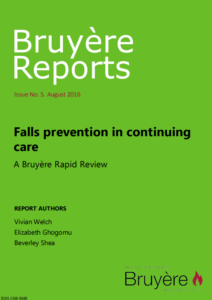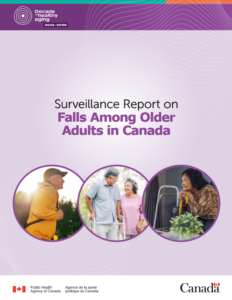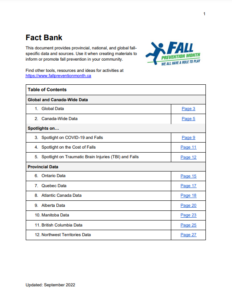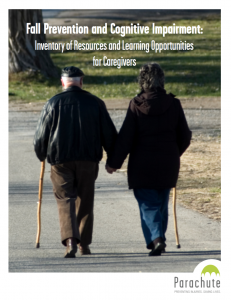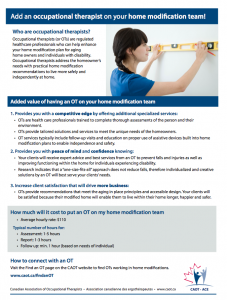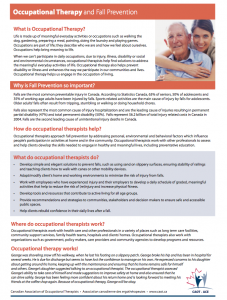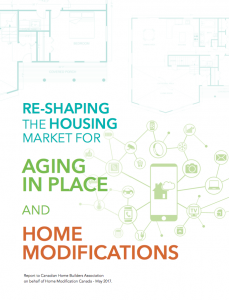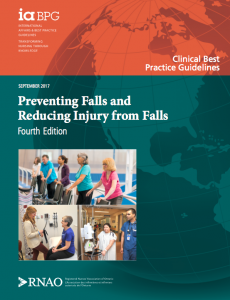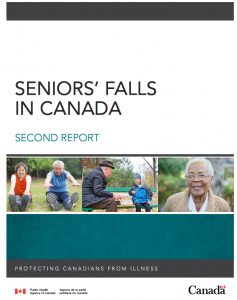All resources
-
Clinical Practice Guideline for Management of Osteoporosis and Fracture Prevention (2023)
This guideline developed by Osteoporosis Canada provides recommendations on the diagnosis and management of osteoporosis. The guideline has 25 key recommendations and 10 good practice statements with emphasis on the areas of exercise, nutrition, fracture risk assessment, treatment and interventions.
-
Interventions for preventing falls in older people in care facilities and hospitals
This review assesses the effects of interventions designed to reduce the incidence of falls in older people in care facilities and hospitals.
-
Environmental interventions for preventing falls in older people living in the community
This review assesses the effects (benefits and harms) of environmental interventions (such as fall‐hazard reduction, assistive technology, home modifications, and education) for preventing falls in older people living in the community.
-
Promoting physical activity for older people: a toolkit for action (2023)
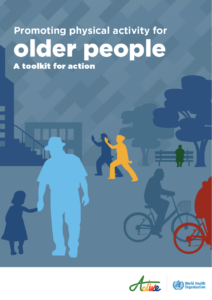
This World Health Organization toolkit provides evidence-based guidance on the key approaches to promote and enable older people to be physically active, regardless of who they are, where they live, or their intrinsic capacities (for example their visual or cognitive abilities) or whether they live with chronic conditions (for example, diabetes, hypertension, and arthritis).
-
Barriers and enablers for screening and assessing fall risk in older adults: an overview (2022)
Through a synthesis of the published literature as well as surveys and interviews conducted with Canadian fall prevention practitioners/ clinicians, the following report provides an overview of the key barriers to fall risk screening and assessment as well as the key enabling factors or facilitators promoting the implementation of screening/assessment.
226.19 KB PDF/UA
-
Centre for Aging SMART
The Centre for Aging SMART at Vancouver Coastal Health (VCH) is a University of British Columbia affiliated, internationally recognized research centre to accelerate discoveries and new knowledge to improve the lives of an aging population and individuals living with a disability.
-
Finding Balance British Columbia
Finding Balance British Columbia has a toolkit with posters, articles and screensavers as well as translated resources for older adults in Farsi, Cantonese and Punjabi. The site also has unique information including videos specific to vision, exercise, home safety, sidewalk safety, medications and long-term care.
-
Finding Balance New Brunswick
Finding Balance New Brunswick contains practice guidelines, tools, guides, and other resources in English and French.
-
Finding Balance Newfoundland and Labrador: Eastern Health Region
Finding Balance Newfoundland and Labrador has two websites for two of their health regions. This website is for their Eastern Health Region. Both websites provide information on the Finding Balance Campaign with posters available. Other resources link to Fall Prevention Month.
-
Together In Movement and Exercise (TIME)
TIME is a community-based program welcoming people with balance and mobility challenges to exercise. It focuses on functional mobility exercises, done mostly in standing, with hand supports available to assist with balance. The program is designed by physiotherapists at Toronto Rehab, and led by TIME-trained fitness instructors in community centres across the country.
-
Stay On Your Feet – Northeastern Ontario Region
The Stay on Your Feet strategy of Northeastern Ontario provides resources for older adults and healthcare providers focused on reducing falls and fall-related injuries and supporting older adults to stay active, social and strong
-
Preventing Falls in Long-Term Care
The Ontario Centres for Learning, Research and Innovation in Long Term Care (CLRI) at the Schlegel-UW Research Institute for Aging (RIA) offers self-paced orientation courses on fall prevention for clinical and non-clinical team members. Preventing Falls in Long-Term Care for Clinical Team Members teaches members in clinical roles about fall risk factors, falls risk assessments, interventions and strategies for falls prevention, and strategies for communicating about falls prevention with residents, essential care partners and other team members. Preventing Falls in Long-Term Care (Non-Clinical Team Members) teaches non-clinical team members about appropriate awareness and corresponding actions to take to effectively prevent falls and keep residents safe.
-
Technology for Injury Prevention in Seniors (TIPS) Fall Videos
Offered by Simon Fraser University, TIPS is a unique university-community partnership for developing new technologies to prevent falls and fall- related injuries in older adults. TIPS uses innovative approaches (such as video capture and wearable sensors) to determine the causes and circumstances of falls by older adults. TIPS also develops and tests the effectiveness of engineering interventions such as protective clothing and compliant flooring in reducing fall-related injuries. TIPS offers four fall prevention-specific modules on their YouTube channel: What causes falls?, Hip protectors, Protect your head and Clinical risk factors.
-
Customizable ‘Staying Independent Checklist’ (2023)
Customize this Staying Independent Checklist by adding your organization’s logo and website details or leave it as is. The Staying Independent Checklist is a self-screening tool for older adults to find out if they are at risk for falling. Older adults are encouraged to complete the Checklist and to follow-up with their healthcare provider as needed.
1.50 MB Word
-
World Guidelines for Falls Prevention and Management for Older Adults: A Global Initiative
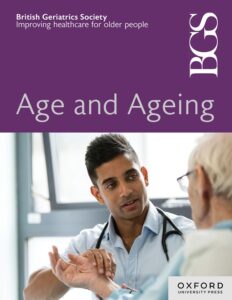
These guidelines were published in September 2022 in Age and Ageing, the scientific journal of the British Geriatrics Society. These guidelines were developed by the World Falls Task Force, which assembled 96 multidisciplinary experts from 39 countries across five continents, with representation from 36 scientific and academic societies.
-
Fracture Prevention Toolkit (in Long-Term Care)
The Ontario Osteoporosis Strategy for Long-Term Care is a province-wide program of outreach activities aimed at increasing awareness about fracture prevention, specifically in long-term care, with a focus on the importance of appropriate vitamin D and calcium intake, and on fall prevention. The toolkit contains valuable, practical information useful for healthcare professionals, caregivers and older adults living in long-term care homes and the community.
-
Bruyère Rapid Review: Falls Prevention in Continuing Care (2016)
-
Alberta Health Services Falls Risk Management Post-Falls Review (2014)
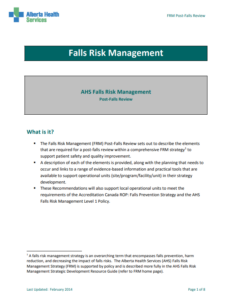
The review describes the elements required for a post‐falls review within a comprehensive falls risk management strategy to support patient safety and quality improvement. A description of each element is provided, along with the planning that needs to occur and links to evidence‐based information and practical tools available to support operational units (site/program/facility/unit) in their strategy development.
426.46 KB PDF
-
Reactive Balance Training Toolkit (Rebal Kit)
Many people, such as older adults and individuals with stroke, are at increased risk for falls. In order to keep from falling down, people must often perform rapid and sophisticated reactions, such as stepping or grasping movements. Reactive balance training (RBT) retrains these rapid reactions. RBT has been shown to improve control of rapid balance reactions and reduce fall rates by almost half compared to no exercise or typical balance training.
-
An Upstream Approach to Falls Prevention (learning module)
This online learning module was developed with public health professionals in mind, as well as others who work in the community who have an opportunity to impact the lives of older adults as they age. The purpose of the module is to understand the importance of older adult falls prevention and be aware of upstream actions and strategies that can be used to address falls. The module introduces facts about falls, risk factors for falls and provides a comprehensive health promotion framework to address falls in older adults and the broader population. The module takes approximately 30 minutes to complete.
-
Healthy Living Workshop (Active Aging Canada)
Active Aging Canada’s Healthy Living Workshop resources include:
Your Personal Passport to Healthy Living
Tool Kit for Healthy Living Workshops for Older Adults
Guidebook for Community Leaders
Virtual Facilitation Training Slide Deck (English only)
24-Hour Movement Guidelines and Workshop Posters
-
Falls and Fall Prevention Among Older Adult Indigenous People of Australia, Canada, New Zealand and the United States: A systematic review (2016)
This systematic review presents detailed findings by the four countries represented in this review: Australia, Canada, New Zealand and the United States. The review of 34 articles shows that falls are the leading cause of injury for older adults in Indigenous communities, a pattern also found among non-Indigenous elderly, and the articles provide information on incidence and prevalence, as well as and fall prevention and related risk factors.
227.80 KB PDF
-
Surveillance report on falls among older adults in Canada (2022)
-
People living with arthritis
Arthritis Research Canada has developed two videos on fall prevention for those living with arthritis.
Episode 7 of the Arthritis Research Education Series focuses on how this organization is working to prevent falls in older adults through research and why this topic is important for people living with arthritis.
Learn how to prevent falls from Senior Scientist and physiotherapist, Dr. Linda Li, in Preventing Falls in Older Adults webinar recording.
-
Finding Balance Newfoundland and Labrador: Western Health Region
Finding Balance Newfoundland has two websites for two of their health regions. This website is for their Western Health Region. Both websites provide information on the Finding Balance Campaign with posters available. Other resources link to Fall Prevention Month.
-
Falls: Common, Costly and Preventable (webinar)
Recorded Thursday Nov. 18, 2022, and organized by the Canadian Association of Retired Persons (CARP) featuring Nancy Edwards, Professor Emeritus and Distinguished Professor at the University of Ottawa; Dori Krahn, Community Relations Co-ordinator for the Saskatoon Fire Department who leads the Remembering When program, a fire safety and fall prevention program for older adults; and Stephanie Cowle, Director of Knowledge Translation at Parachute.
-
Fact bank
-
Injury in Review, 2020 Edition: Spotlight on Traumatic Brain Injuries across the Life Course
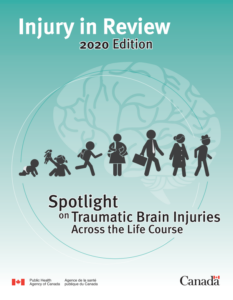
This report provides national surveillance statistics on head injuries and traumatic brain injuries across the life course, including deaths, hospitalizations and emergency department visits, using data sources including the Canadian Vital Statistics Death Database of Statistics Canada; the Hospital Morbidity Database and Discharge Abstract Database of the Canadian Institute for Health Information (CIHI); the National Ambulatory Care Reporting System of CIHI; and the Electronic Canadian Hospitals Injury Reporting and Prevention Program database (eCHIRPP).
4.23 MB PDF
-
Loop fall prevention webinars
Loop Fall Prevention Community of Practice provides webinars regularly on topics related to fall prevention. These webinars are recorded and uploaded to Loop’s YouTube channel. The webinars are hour-long presentations from experts in the field. They highlight evidence-based information with practical applications for health-care practitioners.
-
Fall risk screening and assessment in older adults: an overview of clinical practice guidelines (CPGs) in Ontario (2022)
-
An Environmental Scan of Older Adult Fall Prevention Indicators (2020)
-
Screening and Assessment Tools for Falls in Older Adults in Ontario (2020)
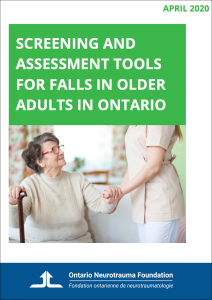
The Ontario Fall Prevention Collaborative (OFPC), Knowledge Resource Working Group has developed a draft document to help health systems partners and professionals in locating the right screening or assessment tools for fall prevention for older adults in Ontario. The purpose of this document is to provide a first version of what currently exists as screening or assessment tools for falls in older adults within Ontario. However, further work needs to be done around recommendations from the Ontario Fall Prevention Collaborative on fall prevention screening and assessment tools with high impact for the intended target population, broken down by sector. Further engagement with various provincial and national stakeholders is underway, and an updated phase 2 version of this resource document will be shared upon that time.
1.19 MB PDF/UA
-
Canadian 24-Hour Movement Guidelines for Adults ages 65 years and older: An Integration of Physical Activity, Sedentary Behaviour, and Sleep
This guideline offers clear direction on what a healthy 24 hours looks like for Canadian adults aged 65 years and older.
-
Focus on women (Fall Prevention Conference 2020)
November 20, 2020 from 12pm to 1pm (EST)
Theme: Balance Flow Yoga: A Community-Based Intervention for Peri and Post-Menopausal Women
Presenters: Dr. Brenna Bath, Dr. Cathy Arnold and Shelly Prosko, School of Rehabilitation Science, University of Saskatchewan Prosko PhysioYoga -
Focus on Indigenous peoples: Part 2 (Fall Prevention Conference 2020)
November 19, 2020 from 3pm to 4pm (EST)
Theme: It takes a village to prevent a fall – how Loop helps you stay connected and informed
Presenter: Shameeza Allard, Ontario Neurotrauma Foundation -
Focus on Indigenous peoples: Part 1 (Fall Prevention Conference 2020)
November 19, 2020 from 12pm to 1:30pm (EST)
Theme 1: Pan-Canadian Fall Prevention Training: Current and Future Opportunities
Presenter: Dr. Vicky Scott, School of Population and Public Health at the University of British Columbia
Theme 2: Indigenous Fall Prevention Network: An Overview
Presenter: Dr. Kathy Belton, Injury Prevention Centre, School of Public Health, University of Alberta -
Falls among older adults: Part 4 (Fall Prevention Conference 2020)
November 18, 2020 from 3pm to 4pm (EST)
Theme 1: #FallPreventionCanada
Presenter: Valerie Smith, Parachute
Theme 2: Functional Independance in Acute Care
Presenter: Suzanne Baker, Nova Scotia Health
Theme 3: The Injury Pyramid of Impacts and Injuries to Body Parts from Video-Captured Falls in Long-term-care
Presenter: Dr. Vicki Komisar, Simon Fraser University
Theme 4: Vitamin D Supplementation for the Prevention of Falls and Fractures in Residents of Long-Term Care
Presenter: Kathleen Kulyk, Canadian Agency for Drugs and Technologies in Health (CADTH)
Theme 5: Seniors’ Falls in Canada
Presenter: Wendy Thompson and Joanne Bowater, Public Health Agency of Canada -
Falls among older adults: Part 3 (Fall Prevention Conference 2020)
November 18, 2020 from 12pm to 1 pm (EST)
Theme: Strong, Balanced and FAST: Working Together to Prevent Fall-Related injuries in Older Adults
Presenter: Dr. Cathy Arnold, School of Rehabilitation Science, University of Saskatchewan
Theme 2: Assessing mobility and safety of people with dementia using mobility aids to prevent falls
Presenter: Dr. Susan Hunter, School of Physical Therapy, University of Western Ontario -
Falls among older adults: Part 2 (Fall Prevention Conference 2020)
November 17, 2020 from 3pm to 4pm (EST)
Theme 1: Finding Balance: Prevention Older Adult Falls in an Evolving Context
Presenter: Nan Shybunka, Injury Prevention Centre, School of Public Health, University of Alberta
Theme 2: Medications and Fall Risk: Educational Outreach as an Intervention Strategy
Presenter: Loren Regier, Canadian Academic Detailing Collaboration (RxFiles AD and CEP AD)
Theme 3: Medication Prescribed to Ontario Older Adults One Year prior to a fall-related injury
Presenter: Yu Ming, Health and Rehabilitation Sciences, Western University
Theme 4: Falls Risk Assessment and Management for Community-Dwelling Older Adults: Developing a BC Clinical Practice Guideline
Presenters: Denise Beaton and Megan Oakey, British Columbia Centre for Disease Control -
Falls among older adults: Part 1 (Fall Prevention Conference 2020)
November 17, 2020 from 12pm to 1pm (EST)
Theme 1: Steppin’ Up with Confidence Plus: The Development and Delivery of a Community Falls Prevention Exercice Program
Presenter: Kristine MacDonald, Prairie Mountain Health
Theme 2: Care Communities – An Opportunity for Upstream Fall Prevention
Presenter: Phyllis Hegstrom, Home Instead Senior Care
Theme 3: Remembering When – Fire Departments Working fo Prevent Fire and Falls
Presenter: Dori Krahn, Saskatoon Fire Department -
Strategies and Actions for Independent Living (SAIL) Course
This short, practical fall-prevention course is designed for home health care aides who provide day-to-day in-home care for frail older adults or persons with disabilities. In addition to training, after the course is completed, optional renewable access to the SAIL Resources is available to graduates, as well as to organizations such as home care agencies, health authorities and community health services.
-
Exercise for Preventing Falls for Older People Living in the Community
This review assesses the effects (benefits and harms) of exercise interventions for preventing falls in older people living in the community.
-
Hip fracture: Care for people with fragility fractures
This resource provides a guide for patients; a guide for clinicians; an information brief demonstrating why the quality standard is needed; quality improvement tools and resources; and performance indicators to help clinicians and organizations track their progress against the standard.
-
Step Ahead to Fall Prevention Training
[Developed in partnership between York Region Public Health and Toronto Public Health] The e-learning module is for health care providers, caregivers and individuals who provide care to older adults. The program consists of two modules. Module 1 on Fall Prevention is available to complete online at your own pace.
-
Positive Steps Work
[Provided by Durham Region Health Department] This evidence-based course helps you to understand how a fall affects seniors, their family and the healthcare system. It looks at the risks that can lead to a fall; and caregiver, family and of seniors’ point of view and the importance of fall prevention. Finally, it helps to identify community resources to help prevent falls.
-
Learn how to prevent falls
Developed by Ottawa Public Health and Champlain Local Health Integration Network (LHIN)This module is for anyone concerned about older adults who would like to learn valuable information regarding falls and fall prevention, such as:
• Personal support workers;
• Volunteers;
• Friends and family; and
• Older adults who support others close to them. -
Fall Prevention Education Series
Provided by Upper Grand Family Health Team & VON Canada. A YouTube playlist. Presentations by allied health professionals from the Upper Grand Family Health Team & Wellington County area, filming and editing by Adam Olivero on behalf of Wightman Telecom (last updated Feb. 19, 2019).
-
Falls & Mobility
Falls & Mobility, offered by the Centre for Studies in Aging & Health, is an online educational course designed for health care providers’ continuing education and professional development. The course aims to improve knowledge about risk factors, recommendations for screening and management strategies.
-
Fall Prevention and Cognitive Impairment: Inventory of resources and learning opportunities for caregivers (2018)
-
Age-friendly communities – Public Health Agency of Canada
This website from the Public Health Agency of Canada describes the Age-Friendly Communities initiative, explains what makes a community age-friendly and provides information about Canadian communities that are striving to support the health and well-being of older people.
-
Bill C-81 An Act to ensure a barrier-free Canada (2019)
The Accessible Canada Act enhances the full and equal participation of all persons, especially persons with disabilities, in society. This is to be achieved through the realization, within the purview of matters coming within the legislative authority of Parliament, of a Canada without barriers, particularly by the identification, removal and prevention of such barriers.
-
A Dementia Strategy for Canada: Together We Aspire (2019)
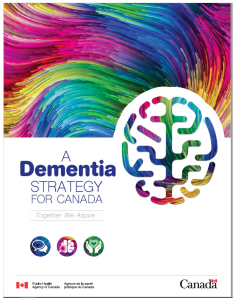
The Public Health Agency of Canada shares Canada’s first national strategy on dementia to set out a vision for the future and identifies common principles and national objectives to help guide actions by all levels of government, non-governmental organizations, communities, families and individuals.
-
Seniors’ Fall Prevention and the Social Determinants of Health: A Social Policy Lens (2019)
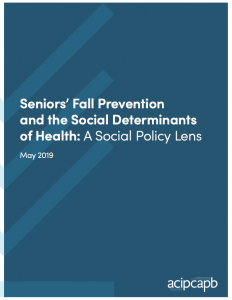
Produced by the Atlantic Collaborative on Injury Prevention (ACIP), this document:
- Provides background information on fall-related injuries among seniors;
- Highlights the social determinants of health and the evidence linking them to seniors’ fall prevention;
- Discusses activities that seek to address the social determinants of health in preventing falls among seniors; and, lastly,
- Highlights current seniors’ fall prevention initiatives by each Atlantic province and provides examples of social policies that could enhance and/or complement seniors’ fall prevention efforts.
-
Medication Use and Seniors (2017)
Canadian Medical Association policy update 2017.
-
Occupational therapists on home modification teams
-
Occupational therapy and fall prevention
-
Re-shaping the Housing Market for Aging in Place and Home Modifications (2017)
-
Long-term Care Best Practices Toolkit (2nd edition, 2018): Fall Prevention and Management
The following resource is designed to assist Long-Term Care (LTC) homes with the implementation of the Prevention of Falls and Fall Injuries in the Older Adult Best Practice Guideline. Provided by the Registered Nurses’ Association of Ontario.
-
Healthy Aging through Fall Prevention among Older Aboriginal People (2011)
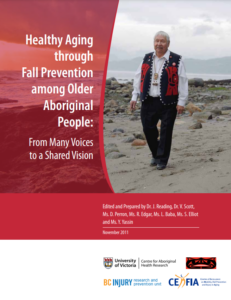
The Centre for Aboriginal Health Research, the Centre of Excellence on Mobility, Fall Prevention and Injury in Aging, the BC Injury Research and Prevention Unit, the BC Seniors Secretariat, and the University of Victoria Centre on Aging hosted a two-day symposium exploring the elements of an Aboriginal approach to Fall Prevention. The following report summarizes the agenda and rationale for the Symposium, the role of knowledge translation, key themes and emerging discussions, information generated, and suggestions for the next steps for creating an Aboriginal approach to fall prevention.
-
Reducing Falls and Injuries from Falls Getting Started Kit
The Falls GSK was developed as part of the Canadian Patient Safety Institute’s signature program, Safer Healthcare Now! The Falls GSK was developed to engage interdisciplinary teams in a dynamic approach for improving quality and safety on the topic of falls prevention.
-
Canadian Centre for Activity and Aging – University of Western Ontario
The CCAA is a unique, national research and education centre within the Faculty of Health Sciences at Western. It promotes physical activity and well-being for older adults through a combination of basic and applied research, education, and community-based exercise programs. Its education and leadership training programs instruct thousands of individuals across Canada in standard, evidence-based practices to enhance the functional fitness of older adults at every level of mobility.
-
Dementia and falls – Canadian Institute for Health Information (2018)
This webpage from the Canadian Institute for Health Information (CIHI) provides a spotlight on data relating to falls among older adults with dementia.
-
Indigenous Fall Prevention Symposium Report to the Public Health Agency of Canada (2018)
This report, prepared by Dr. Vicky Scott, presents the Indigenous Fall Prevention Symposium’s findings and recommendations to the Public Health Agency of Canada.
-
Fall and injury prevention – Mc
Master Optimal Aging Portal Consult evidence-based blog posts, web resource ratings and evidence summaries for trustworthy information about health and social aspects of aging.
-
Falls Prevention Clinic – Vancouver Coastal Health
Enhancing mobility while preventing falls and fractures through evidence-based practice and research.
-
Homecare Safety Virtual Quality Improvement Collaboratives
A cutting-edge approach to falls management in the home setting, launched by the The Canadian Home Care Association, together with the Canadian Patient Safety Institute and the Canadian Foundation for Healthcare Improvement. Through shared learning, teams from a different jurisdictions and provider types work with each other and recognized safety experts to rapidly test and implement changes that lead to sustained improvement.
-
Seniors Maintaining Active Roles Together (SMART)
Community-based, volunteer-led exercise programs for seniors that accommodate all levels of ability.
-
Loop, Fall Prevention Community of Practice
Loop is the online communication platform that brings together frontline workers, practitioners, caregivers, researchers and policy planners working for the health and independence of the public through fall prevention. Loop is a place to problem-solve together and discuss how to implement evidence-informed and promising practices.
-
Clinical Best Practice Guidelines: Preventing Falls and Reducing Injury from Falls (Fourth Edition, 2017)
-
Finding Balance Alberta
Finding Balance is a falls prevention program that provides seniors and practitioners with the latest information and resources to help seniors live an active and independent lifestyle. The program uses real life strategies that older adults can use to lower their risk of a fall.
-
Canadian Fall Prevention Curriculum (2017)
The CFPC provides those working with older adults the knowledge and skills needed to apply a public health approach to the prevention of falls and fall-related injuries. Participants learn how to design, implement and evaluate a fall prevention program tailored to their work or community setting.
-
Seniors’ Falls in Canada (Second report, 2014)
-
Stay On Your Feet – Australia
Stay On Your Feet® is Western Australia’s falls prevention program for older adults living in the community. Stay On Your Feet® aims to reduce falls and fall-related injuries among older adults living in the community and encourages older adults to feel confident in independent living.
-
Fall Prevention Month
